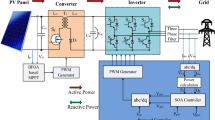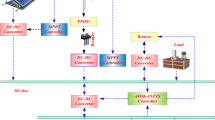Abstract
Renewable energy resources are non-pollution resources that can meet up the electricity needs without inflicting any environmental troubles. In this research work, Maximum Power Point Tracking (MPPT) behavior is taken into account for improving the power output for the grid-integrated solar photovoltaic (PV) farm with the help of a combination BFPSO tuned intelligent ANN controller. An Artificial Intelligence (AI)-based MPPT technique is utilized in solar PV arrays to maximize the electrical power output and satisfy the power demand. The combination BFPSO algorithm is selected for optimizing the connection weights in the ANN controller, and the developed ANN controller regulates the duty cycle of the DC/DC converter by monitoring the voltage and current profile of the solar PV farm. The developed optimization algorithm is implemented to get maximum feasible power from the 400 kW PV farm. Also, the proposed combination BFPSO tuned ANN controller is evaluated through means of predictable procedures like Particle Swarm Optimization (PSO), Bacterial Foraging Optimization Algorithm (BFOA). The simulation part of the proposed work is carried out in MATLAB/SIMULINK software.
Access this chapter
Tax calculation will be finalised at checkout
Purchases are for personal use only
Similar content being viewed by others
References
Panwar NL, Kaushik SC, Kothari S (2011) Role of renewable energy sources in environmental protection: a review. Renew Sustain Energy Rev 15(3):1513–1524
Baba AO, Liu G, Chen X (2020) Classification and evaluation review of maximum power point tracking methods. Sustain Futures 2:100020
Pakkiraiah B, Sukumar GD (2016) Research survey on various MPPT performance issues to improve the solar PV system efficiency
Ji Y-H, Jung D-Y, Kim J-G, Kim J-H, Lee T-W, Won C-Y (2011) A real maximum power point tracking method for mismatching compensation in PV array under partially shaded conditions. IEEE Trans Power Electron 26(4):1001–1009
Fadaee M, Radzi MAM (2012) Multi-objective optimization of a stand-alone hybrid renewable energy system by using evolutionary algorithms: a review. Int J Renew Sustain Energy Rev 16(5):3364–3369
Kaleem Z, Yoon TM, Lee C (2016) Energy efficient outdoor light monitoring and control architecture using embedded system. IEEE Trans Embedded Syst Lett 8(1):18–21
Sera D, Mathe L, Kerekes T, Spataru SV, Teodorescu R (2013) On the perturb-and-observe and incremental conductance MPPT methods for PV systems. IEEE J Photovolt 3(3):1070–1078
Putri RI, Wibowo S, Rifa’I M (2015) Maximum power point tracking for photovoltaic using incremental conductance method. Int J Energy Procedia 68:22–30
Xiao X, Huang X, Kang Q (2016) A hill-climbing-method-based maximum-power-point-tracking strategy for direct-drive wave energy converters. IEEE Trans Ind Electron 63(1):257–267
Lin F-J, Lu K-C, Ke T-H (2016) Probabilistic wavelet fuzzy neural network based reactive power control for grid-connected three-phase PV system during grid faults. Int J Renew Energy 92:437–449
Youssef A, El Telbany M, Zekry A (2018) Reconfigurable generic FPGA implementation of fuzzy logic controller for MPPT of PV systems. Int J Renew Sustain Energy Rev 82:1313–1319
Abdel-Salam M, El-Mohandes M-T, Goda M (2018) An improved perturb-and-observe based MPPT method for PV systems undervarying irradiation levels. Int J Sol Energy 171:547–561
Tian H, Mancilla-David F, Ellis K, Muljadi E, Jenkins P (2012) A cell-to-module-to-array detailed model for photovoltaic panels. Int J Sol Energy 86(9):2695–2706
Rai AK, Kaushika ND, Singh B, Agarwal N (2011) Simulation model of ANN based maximum power point tracking controller for solar PV system. Int J Sol Energy Mater Sol Cells 95(2):773–778
Jegajothi B, Yaashuwanth C (2018) Embedded controller based maximum power point tracking for photovoltaic system using adaptive technique. Int J Electr Eng 18, edition-1. Print ISSN 1582-4594
Passino KM (2002) Biomimicry of bacterial foraging for distributed optimization and control. IEEE Trans Control Syst 22(3):52–67
Sudhakar Babu T, Priya K, Maheswaran D, Sathish Kumar K, Rajasekar N (2015) Selective voltage harmonic elimination in PWM inverter using bacterial foraging algorithm. Int J Swarm Evol Comput 20:74–81
Ishaque K, Salam Z, Amjad M, Mekhilef S (2012) An improved particle swarm optimization (PSO)–based MPPT for PV with reduced steady-state oscillation. IEEE Trans Power Electron 27(8):3627–3638
Babu YS, Sekhar KC (2020) Battery assisted, PSO-BFOA based single stage PV inverter fed five phase induction motor drive for green boat applications. In: Intelligent systems, technologies and applications. Springer, Singapore, pp 227–240
Bouselham L, Hajji M, Hajji B, Bouali H (2017) A new MPPT-based ANN for photovoltaic system under partial shading conditions. Energy Procedia 111:924–933
Subudhi B, Pradhan R (2017) Bacterial foraging optimization approach to parameter extraction of a photovoltaic module. IEEE Trans Sustain Energy 9(1):381–389
Sarvi M, Ahmadi S, Abdi S (2015) A PSO-based maximum power point tracking for photovoltaic systems under environmental and partially shaded conditions. Prog Photovolt Res Appl 23(2):201–214
Zhu Z, Liu G (2018) MPPT control method for photovoltaic system based on particle swarm optimization and bacterial foraging algorithm. Int J Electr Compon Energy Convers 4(1):45
Author information
Authors and Affiliations
Editor information
Editors and Affiliations
Rights and permissions
Copyright information
© 2022 The Author(s), under exclusive license to Springer Nature Singapore Pte Ltd.
About this paper
Cite this paper
Jegajothi, B., Yaashuwanth, C., Prathibanandhi, K., Sudhakar, S. (2022). Combination BFPSO Tuned Intelligent Controller for Maximum Power Point Tracking in Solar Photovoltaic Farm Interconnected to Grid Supply. In: Suhag, S., Mahanta, C., Mishra, S. (eds) Control and Measurement Applications for Smart Grid. Lecture Notes in Electrical Engineering, vol 822. Springer, Singapore. https://doi.org/10.1007/978-981-16-7664-2_1
Download citation
DOI: https://doi.org/10.1007/978-981-16-7664-2_1
Published:
Publisher Name: Springer, Singapore
Print ISBN: 978-981-16-7663-5
Online ISBN: 978-981-16-7664-2
eBook Packages: EnergyEnergy (R0)




